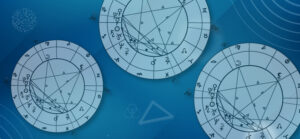Our journey through the astrological houses begins in House 1, where our Ascendant sign lives. After gaining self-awareness, we move on to House 2. Here, we give substance to our identity and learn our potential for fulfillment. Over time, we understand our personality, become aware of our limitations and figure out how to get around them. In the meantime, we arrive at House 3, the House of the mind, brothers, and the environment.
Index
Third Astrological House
- Sphere - Communication
- Planet - Mercury
- Sign - Gemini
- Element - Air
- Quality - Mutable
- Polarity - Male
- Position - Candent
- Physiology - Hands, arms, shoulders
- Places - Schools
- Color - Yellow
- Keywords - Communication, language, immediate surroundings, mind, environment, brothers, neighbors
House 3 and Personality Development
Associated with the planet Mercury and with the sign Gemini, the Third Astrological House reflects the entry into a new stage of our life. At this stage, we already have the capacity to examine the world around us, interact with it, and form ideas and opinions about what we are finding.
At the level of human development, House 3 corresponds to the moment when we start to crawl and, soon, to walk. Growing and exploring are qualities that are part of our genes. Once we were able to lift our heads off the pillow and turn our necks to see further, we never stopped being fascinated by the unknown.
As long as we feel minimally secure (a concept that can be very different between parents and their babies), we never stop trying to understand the world, questioning it and exploring it. To the movement, language joins. The first words, the jokes, the faces, the crying of pampering, the calls for attention. All babies know how to seduce their caregivers. To communicate their needs and get what they want (almost always).
At the same time as all this development takes place, inevitably comes the feeling of frustration. When we want to pick up a toy and we can't or we're so exhausted that we can't fall asleep.
The time for rules and limits has arrived. What we can and cannot do. Of actions and behaviors that are applauded or that deserve a reprimand. Through language, we enter the world of symbols, ideas, and concepts. We are now able to predict the consequences of our actions.
In the back of our minds, the sense of the abstract begins to develop. The object (or the person) doesn't have to be in sight to exist. When the mother leaves, that doesn't mean she won't come back, just that she disappeared from view. But she is over there, somewhere else than the baby.
House 3 and Structure of Thought
The 3rd House, or "the concrete mind" for some astrologers, marks this new stage: the mind frees itself and differentiates itself from the physical existence, the body. The position of signs and planets in the Third House describes our mental structure, i.e. how we think. Is our mind fast, slow, logical, or analytical? Are our thoughts original and creative or do they reflect the thinking and opinions of those around us?
But it also reveals how we relate to knowledge and the learning process. Mars in House 3 believes that knowledge is power. Moon in the same position can seek knowledge for the security it conveys, for the sense of protection it feels when passing knowledge to someone. House 3 tells us what is external to us. What can we learn when we relate to the world.
Like the Ascendant and the 1st House, the placement of signs and planets in House 3 reveals our predisposition to perceive certain aspects of our surroundings, neglecting or omitting others. For example, Venus in the Third Astrological House absorbs only what is pleasing to it. Saturn, on the other hand, tends to retain the most insensitive aspects of the environment and, therefore, for it, the world is not a place where it can venture in a carefree way.
Family and Social Relations in the Third-House
Thus, the placements in House 3 reflect the meaning we attribute to the outside but also what we retain from it. Due to its inherent proximity, one of the first situations that we get involved in when we go abroad is the brothers.
House 3 shows how we relate to them and to all the people who are part of the closest family circle: parents, caregivers, grandparents, uncles, neighbors. For astrologers, the study of the 3rd House reveals interesting aspects about the way we relate to others and the image we create about those people. But also how we were welcomed into the family when we were born and the impact this event had on these people and on us (by the way we were received).
House 3 also gives us indications about the first experiences at school. The expansion of the social sphere, beyond the family circle, allows us to come into contact with children of the same age (with personalities and life experiences that may be different or similar to ours), and with other adults, such as teachers. Throughout childhood and early adolescence (stages of life associated with this House), we assimilate a series of principles and values that will become the basis of our character.
House 3 and Communication
In mythology, Mercury (natural ruler of House 3) was the messenger of the gods. This House governs all forms of communication - writing, speaking, email, radio, television, magazines, newspapers. The correlation and ability to synthesize information also fall in this House, such as short trips, changes in the environment, and the ability to adapt to new situations.
House 3 describes our family and environmental context. But it also refers to the mind, our predisposition to relate to others and the world, and the way we perceive the reality around us.
The 12 Houses in Astrology
- First House - Our Cosmic First Impression (House of "Self")
- Second House - Material Goods, Money, Personal Resources
- Third House - Mind, Communication, Brothers
- Fourth House - Home, Roots, Family Life
- Fifth House - Creativity, Joy, Pleasure, Children
- Sixth House - Work, Health, Exercise
- Seventh House - Love, Romance, Marriage, Social Activities
- Eighth House - Birth, Death, Sex, Transformation, Mysteries
- Ninth House - Travel, Education, Religion, Philosophy
- Tenth House - Ideal Purpose, Career and Destiny (House of Midheaven)
- Eleventh House - Friendship, Electronics, Technology
- Twelfth House - Imagination, Subconscious Mind, Secrets, Mysteries








